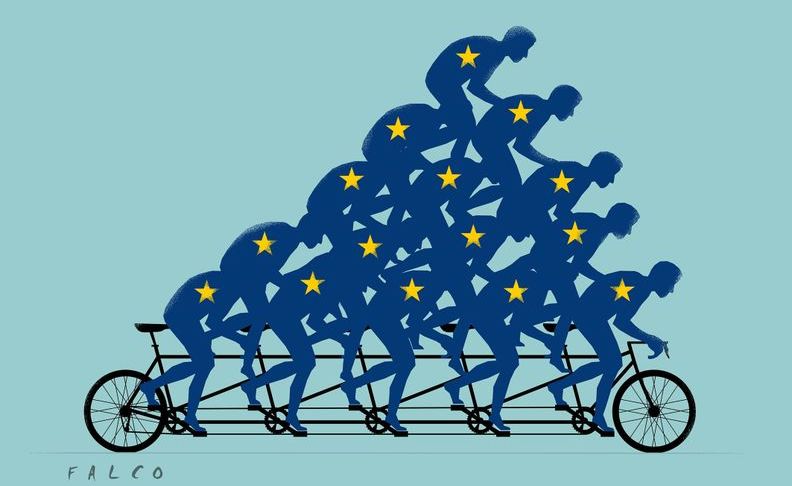It is now clear that the state has decided to put an end to playing around with the creation of an up-to-date nation. The quality of education and the level of knowledge imparted to students in schools and universities will be sacrificed to the immediate needs of Aleksander Lukashenka’s regime.
“No cardinal decisions should be reached after our meeting today”; this is how Lukashenka began the conversation with a gathering of bureaucrats from the educational sphere and the controlling organs of state in late September. However, given the country’s current situation it proved impossible to avoid cardinal measures. As a result, one of the main topics of the meeting was the enserfment of university graduates.
The reason is there for all to see and no one made any special effort to hide it. “The most advanced high-class experts are leaving,” declared the Ruler of Belarus. And that is “unacceptable for the country”.
In Lukashenka’s opinion, the system is to blame for this. Except that it isn’t the system you might be thinking of. It isn’t the system of power, state management and decision making that has been operating in Belarus for nearly thirty years; within it many citizens of the country are unable to see any future for themselves. No, it’s the excessively “liberal” system of allocating places of work to graduates that is to blame for the brain drain from the country – “they’ve got their degrees, they do nothing about paying off their debt to the state and leave the country.”
Students who receive government funding support are currently required to spend two years after graduation in a job and at a place allocated by the authorities. This is no longer sufficient. More is needed. In future workers will have to be tied tightly to their places of work. This will apply not only to those who receive state money, but also to those who pay their own way at college. Lukashenka voiced suggestions and cited precise figures which will obviously form the basis of the ”non-cardinal changes” that are going to be adopted.
A modern form of serfdom
In Lukashenka’s words, there will have to be “compulsory or at least semi-compulsory” measures in place. So, the period of compulsory work could well be five years. For students sent to study by a public body or private organisation the figure might be seven years. And let those students who pay for themselves also be compelled to work for a period in a state-allocated job – the necessary changes to the Law Code on education are now being drafted.
So, what we have now is a modern form of serfdom adapted to the needs of the ruling regime. The long-term consideration is quite clear: very few will be able to afford the compensation payment required by the state to avoid compulsory job allocation. The vast majority of newly-graduated young experts will be compelled to go and work wherever the state considers it necessary to send them.
Then simple arithmetic takes over: people graduate from university when they are about 22 or 23. Add five or maybe even seven years of compulsory work placement. By then the graduates are getting on for 30, they’ll already have families with one or even two children. They’ll have a mortgage on their flat and money to pay back for furnishing it. It becomes much more complicated simply to up sticks and move somewhere else. Of course there will be some who can get away, but by no means all. What a saving this will mean for the state!
Instead of providing economic stimuli to attract people to the parts of the country where they are needed, the state can turn to a simple, cheap method – debt-slavery. Who is then going to be bothered with how to enter higher education – who cares how you do it, when from now on nobody is particularly going to want to. The new slogan of the Belarusian system of education is: “Sell yourself into slavery and get yourself a university degree”.
As a result, of course, many people are going to resign themselves to never going to university, so as to avoid the ensuing many years of forced labour. This is precisely what the state needs. There is a shortage of people on the farms, so go and work there. Without higher education and for peanuts.
Using her ability to peer right into the heart of the state’s needs, the headteacher of one of the Minsk schools who was present at the “serious conversation” stated that it was high time for parents to be disabused of the notion that higher education is essential. It’s true: in much wisdom is much grief. We’ve produced a generation of people who think, and meanwhile there’s no one left to give the cows a good wash.
But even that is not enough. Specialists should be given the kind of training that will render them useless anywhere outside Belarus. The country’s chief prosecutor, Andrei Shved, is outraged by the number of hours given over to teaching English in schools. He fulminates, “Are we training a workforce for the West?” So, farewell, land of IT. We don’t need English. We don’t need the global world or the digital economy.
We don’t have to prevaricate about what the main goal is: the regime doesn’t need just specialists, it requires a special workforce for particular enterprises in the state sector. Not for private business, but for the state sector. The students of today and in the future will be taught not what they think will be valuable for them in later life, but what is demanded by a national economy that can in no way be described as advanced.
Farewell, land of IT. We don’t need English. We don’t need the global world or the digital economy
How a journalist on one of the state TV channels put it is indicative: “Education is the source of development, of a successful economy, of a consolidating ideology, and finally of the state’s vitality”. This is the very essence of the regime’s expectations – everything for the needs of the state. Not a word about people’s individual hopes and aspirations, by which they are going to live and work tomorrow and in 20-30 years’ time. The task of education is to “wash brains” and send forth into the world obedient and undemanding cogs, ready to work in some agricultural or industrial enterprise. Nothing else is of any concern to the state as it now is.
And there’s yet another fad that’s all the rage at the moment – the idea that schoolchildren should become accustomed to manual labour. The school site needs some improvement? Let the children do it. “There will be areas where a fresh coat of paint is needed, where windows or doors have to be replaced, where the school grounds should be tidied up. The children must play a part in all these jobs.” Too right; after all, children don’t go to school to learn, do they? No, they go in order to be taught how to hold a spade properly. Or a hammer. So that from their childhood days they can get used to what their futures are going to be like.
The people in charge have long been saying that nobody needs the Belarusians anywhere. They are needed only in their own country. So now they’ve progressed from words to precise action – with the quality of education they are now talking about, our children really will not be in demand anywhere in the world. And that will be a huge advantage for the state; enserfing people and making them work for pennies is a great deal simpler when the only place they can find a role for themselves is home.
What the regime needs is not a “knowledge economy”, but an “obedience economy”. That is exactly what the regime is investing in; it doesn’t give a damn for the future of the country and the people who live in it.









